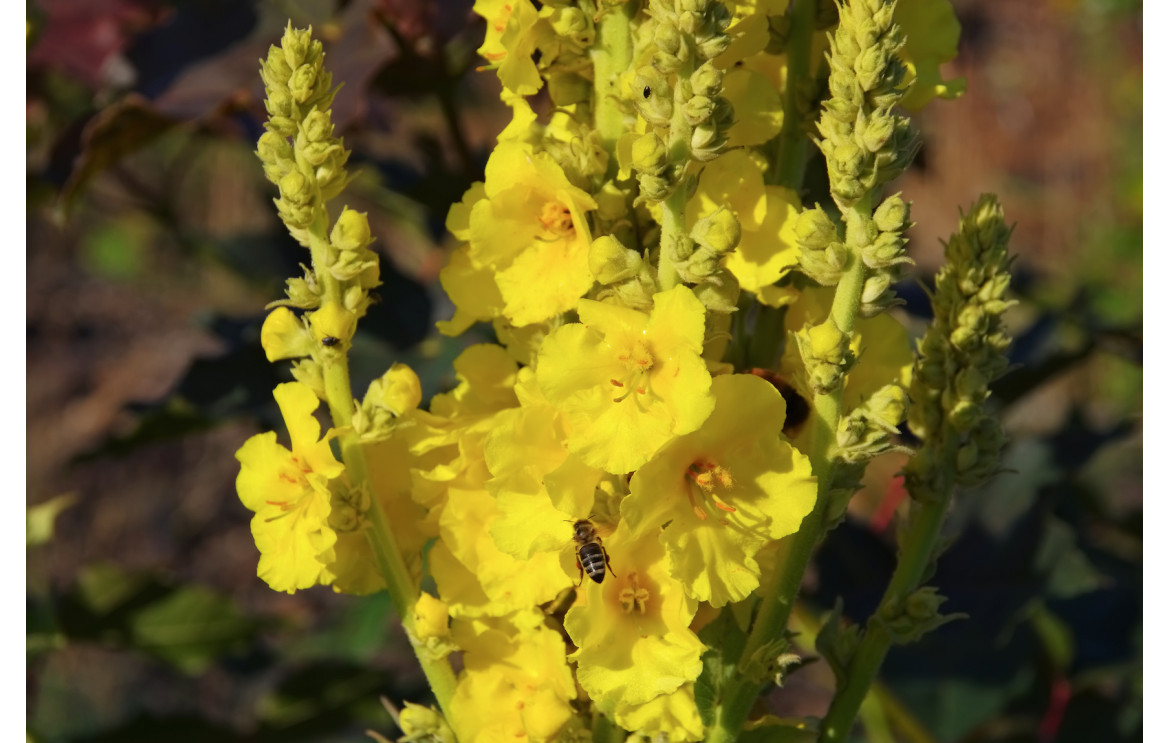
Mullein
19/10/2021 | HerbShopUK
Mullein is used in herbal medicine. Thanks to its health-promoting properties, it can support the treatment of diseases of the upper respiratory tract and bile ducts. It is also used to treat menstrual disorders.
The mullein, with its dignified and magnificent characteristic yellow flowers growing at the end of a long straight stem, used to be called the 'royal candle'. It is a biennial plant that can reach a height of 1.5 to 2 metres. Large-flowered mullein grows wild, for example in meadows and fields. Mullein flowers have many medicinal properties. However, they are very delicate and must therefore be harvested with great care. The plant should be picked when in full bloom, when the dew has dried and should not be dried in the sun. The difficulty in harvesting mullein is also due to the fact that the fresh flowers wilt quickly and lose their yellow colour over time. Large-flowered mullein is undemanding and grows well in both fertile soils as well as harder, more arid ground. It likes a sunny, moist location and is resistant to temperature fluctuations.
Properties
Mullein is a rich source of many valuable ingredients, including flavonoids with anti-inflammatory and antioxidant properties, tannins with antibacterial properties, saponins (which have diuretic and anti-inflammatory properties), as well as mucilaginous compounds, resins, coumarin, essential oil and organic acids. Mullein can be useful in the treatment of respiratory ailments. It can be used in bronchial inflammations, especially those with mucus (systematically drunk infusion of this plant dilutes phlegm and facilitates expectoration). Mullein can also support the treatment of persistent, dry cough and people suffering from asthma. In addition, due to its coating properties, it can alleviate sore throats and hoarseness. It also has a protective effect.
No wonder that mullein is included in syrups for the throat, hoarseness, the respiratory and immune systems. In our shop you can buy it in the form of dried flowers, ideal for brewing tea.
Mullein can also be used in the treatment of digestive system ailments. It may be useful in gastritis, diarrhea, intestinal colic. The plant may also be used externally - in the form of compresses it may be applied in case of contusions, wounds, burns, bedsores or allergic reactions.
It also has a relaxing and analgesic effect, including the relief of pain associated with rheumatic diseases, while calming and soothing.
Use in cosmetics
Mullein is also used in the cosmetic industry. It can be found in hair bleaching preparations and shampoos which strengthen hair and make it shiny and soft. It also has disinfectant properties and can therefore be used to treat acne-prone skin. It is often used in products such as shower gels as it helps cleanse the skin while soothing irritation and is not allergenic.
Mullein - infusion or oil
Mullein flowers are used to make infusions, oils and syrups. To prepare an infusion of dried flowers, pour one tablespoon of the herb into half a litre of boiling water, keep it covered for several minutes and strain it. The obtained essence may be drunk with the addition of honey and lemon or in its pure form. It is recommended to drink half a glass of the infusion daily or one to two teaspoons four times a day.
Instead of an infusion, a decoction can also be prepared. To do so, pour a glass of warm water over mullein and heat to boiling but do not boil. Decoctions are more intense in taste than infusions, but it is recommended to consume the same amount, i.e. about half a glass a day.
On the other hand, mullein oil has soothing properties and is for external use. To prepare it, put about two handfuls of dried flowers in a jar and pour two glasses of olive oil over them. The extract has to wait for about two weeks before it can be used. Before using the extract, all the liquid should be strained and then kept in a cool and shady place. The oil can be useful in treating wounds and ulcers. It can also speed up the disappearance of bruises, and when added to a bath it soothes rheumatic pains and fatigue after physical effort. The oil can also have a calming effect.
Contraindications
A contraindication for the use of mullein - although these are rare cases - may be an allergy to the components of the herb. It cannot be used by pregnant and breast-feeding women. Special care should be taken while administering mullein to children under 12 years of age.
